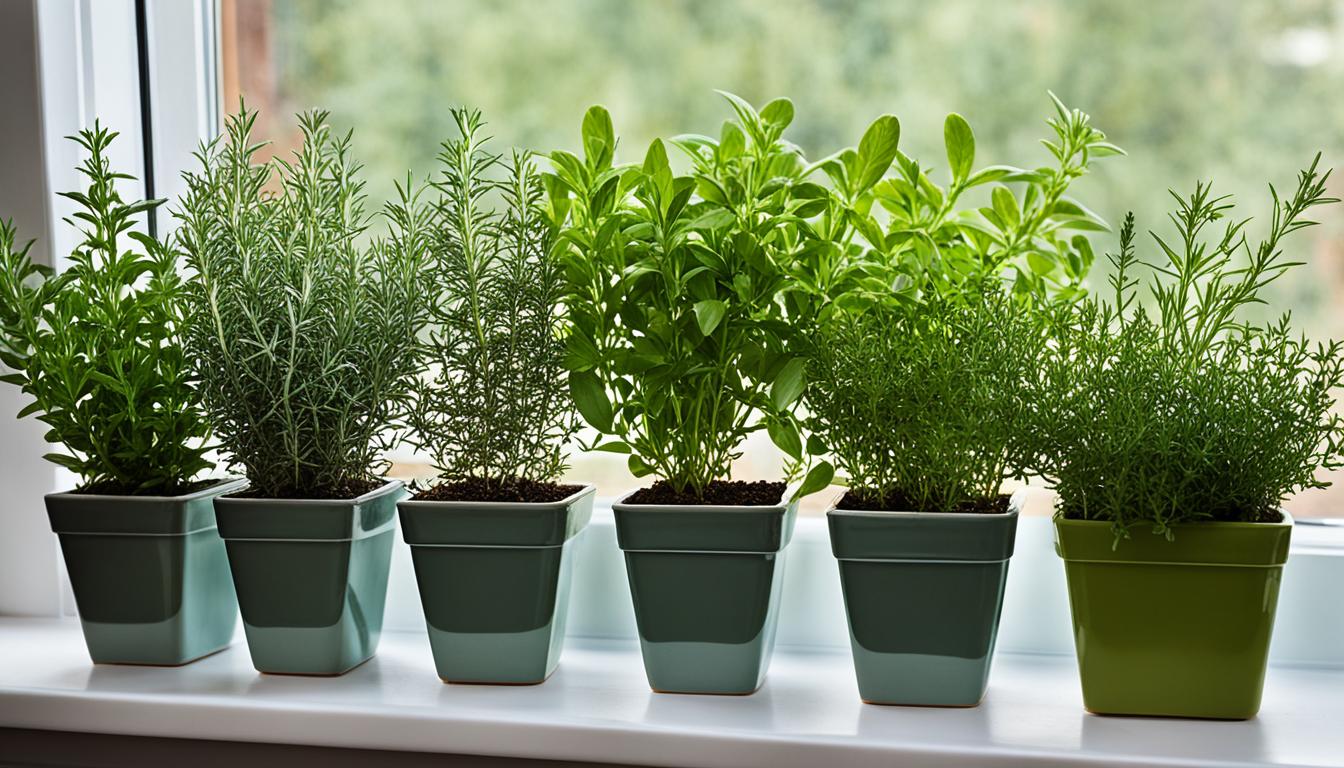Potentially Perfect: The Top Herbs For Container Gardening
Have you ever dreamed of having your own herb garden but thought you didn’t have the space? Think again! With Herbs For container gardening, you can have a flourishing herb garden right in your kitchen or limited outdoor spaces like patios and windowsills. In this article, we will explore the top herbs that are perfect for container gardening, allowing you to enjoy fresh flavors and elevate your culinary creations.
Container gardening is a versatile and convenient way to grow herbs, even in small spaces. Whether you have a tiny kitchen garden or a compact patio, you can still enjoy the satisfaction of growing your own herbs. These herbs will not only provide a constant supply of fresh ingredients but also add a touch of greenery to your living space.
Key Takeaways:
- Container gardening is ideal for small spaces like kitchens, patios, and windowsills.
- Growing herbs in containers allows you to enjoy fresh flavors and elevate your culinary creations.
- With the right herbs and proper care, you can create a thriving herb garden in limited spaces.
- Container gardening adds a touch of greenery and freshness to your living space.
- Experience the joy of harvesting and cooking with fresh, aromatic herbs.
Benefits of Container Gardening
Container gardening has become increasingly popular, especially for gardening enthusiasts with limited space. Whether you have a small patio, balcony, or windowsill, growing herbs in containers offers numerous benefits for creating a thriving herb garden.
One of the primary advantages of container gardening is its versatility. You can easily create a container garden in small spaces, such as patios or windowsills, without the need for a traditional garden bed. This makes it an ideal option for urban dwellers or those with limited outdoor areas.
“Container gardening is a fantastic way to bring the beauty and flavors of fresh herbs into your home, no matter how small your living space may be.” – Amy Thompson, Container Gardening Expert
Another benefit of container gardening is the ability to easily grow and maintain herbs in containers. With the right soil, proper watering, and adequate sunlight, container-grown herbs can flourish and provide an abundant supply of fresh, flavorful additions to your culinary creations.
Container gardens offer flexibility, as you can move the containers around to optimize sunlight exposure for your herbs. This is particularly useful if you have a limited amount of direct sunlight in your outdoor space.
Additionally, container gardening allows you to control the growing conditions of your herbs. You can choose the ideal soil mix, control moisture levels more easily, and prevent weeds and pests from affecting your herb garden. This level of control can help ensure the success of your herb garden and provide a more enjoyable gardening experience.
Container Gardening in Small Spaces
One of the key advantages of container gardening is its suitability for small spaces. Whether you live in a cozy apartment, have a compact patio, or only have access to a windowsill, container gardening allows you to maximize your available space and still enjoy the benefits of growing herbs.
Small spaces, such as patios and balconies, provide excellent opportunities for container gardening. Even a small collection of containers can provide an impressive variety of herbs, allowing you to enjoy fresh aromatics and flavors in your favorite recipes.
Windowsills are also ideal for container gardening, as they offer a convenient location for growing herbs indoors. With proper sunlight exposure, you can easily grow herbs like basil, mint, or rosemary on your windowsill, ensuring a fresh supply for your culinary adventures.
“Container gardening is a fantastic solution for those with small spaces, providing endless possibilities for cultivating herb gardens and enjoying the benefits of fresh herbs in your cooking.” – Sarah Johnson, Urban Gardening Enthusiast
To take advantage of the benefits of container gardening and grow herbs in small spaces, it’s essential to choose the right herbs for container gardening. In the next section, we will explore the best herbs that are well-suited for growing in containers and provide tips on how to maintain them for a thriving herb garden.
Choosing the Right Herbs for Containers
When it comes to container gardening, selecting the right herbs is crucial for success. Certain varieties are better suited for growing in pots, offering convenience and abundant flavors for your culinary creations. Mint, basil, parsley, thyme, rosemary, oregano, and lemon balm are excellent choices for your container herb garden.
Mint is a refreshing herb that thrives in containers. Its aromatic leaves add a burst of freshness to beverages and desserts. Basil, another popular choice, provides the perfect complement to pasta dishes and salads. Its vibrant leaves and distinctive flavors are a must-have in any herb garden.
Parsley is a versatile herb that grows well in pots. Not only does it add a refreshing taste to your dishes, but it also offers a beautiful garnish. Thyme, with its earthy and savory notes, is an excellent addition to soups, stews, and roasted vegetables.
Growing and Thriving in Containers
Rosemary is a hardy herb that excels in container gardening. Its flavorful, needle-like leaves are perfect for seasoning meats and roasted potatoes. Oregano, known for its robust aroma, is a staple in Italian cuisine. It pairs well with tomatoes, pizzas, and pasta sauces.
Finally, lemon balm is an herb that imparts a refreshing lemony flavor to beverages and desserts. This herb is known for its calming properties and is a delightful addition to teas and cocktails.
These herbs are not only easy to grow but also offer a wide range of culinary uses. From mint-infused mojitos to flavorful basil pesto, these herbs will enhance the taste and aroma of your favorite dishes. Plus, having these herbs conveniently located in containers means you can always have them fresh at your fingertips.
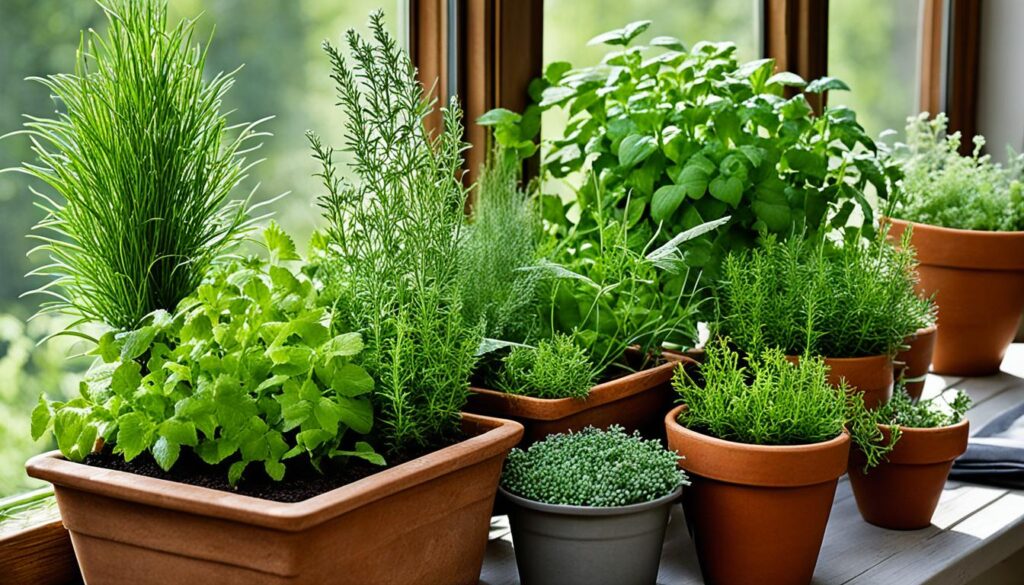
Having a variety of herbs in containers not only adds beauty to your space but also provides the convenience of easy access to fresh, aromatic flavors. With the right herbs in your container garden, you’ll have endless possibilities to elevate your culinary creations.
Container Selection and Preparation
When it comes to successful herb gardening in containers, container selection and preparation play a crucial role. Ensuring proper drainage and providing the right environment for your herbs is key to their growth and development.
To begin, choose pots that have adequate drainage holes to prevent waterlogged roots. Small pots are suitable for smaller herb plants, while larger pots accommodate bigger varieties. Opt for plastic pots that are lightweight and easy to move around, especially if you plan to rearrange your container garden.
Good drainage is essential for the health of your herbs. Excess water should be able to escape the pot easily. Before planting your herbs, assess the drainage holes to ensure they are sufficient. If needed, you can create additional holes using a drill or sharp object. This will prevent water from pooling at the bottom of the pot, which can lead to root rot.
Next, choose a well-draining potting soil that is compost-enriched. This provides the necessary nutrients for healthy herb growth. The soil should be loose and well-aerated, allowing water to flow through it easily. Avoid heavy soils that retain too much moisture, as this can lead to water-related issues.
By selecting pots with good drainage and using well-draining potting soil, you can create an ideal environment for your herb garden. This will promote healthy root development and prevent the risk of overwatering. Keep in mind that different herbs may have varying compost requirements, so it’s always good to research individual needs.
Image:
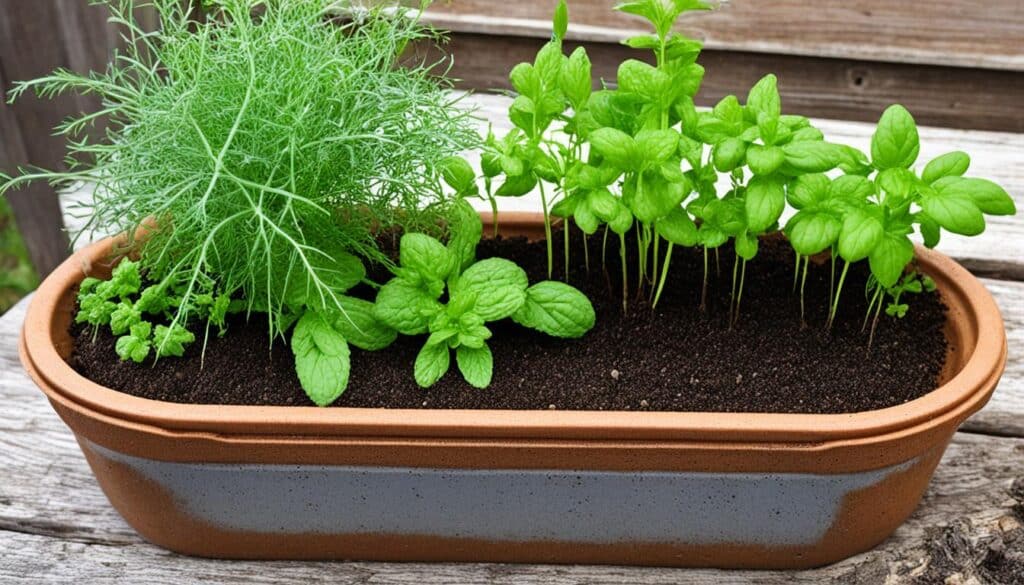
Growing and Maintaining Herbs in Containers
Growing and maintaining herbs in containers is a great way to enjoy a bountiful herb garden, even in small spaces. Whether you have a patio or balcony, or prefer to grow your herbs indoors, container gardening offers flexibility and convenience. By following a few simple tips, you can successfully cultivate culinary herbs with vibrant green leaves that are perfect for adding flavor to your dishes.
Choosing the Right Culinary Herbs for Container Gardening
When selecting herbs for container gardening, opt for varieties that thrive in your specific growing conditions. Some popular culinary herb choices for containers include mint, basil, parsley, thyme, rosemary, oregano, and lemon balm. These herbs not only provide culinary delight but also have glossy green leaves that add beauty to your small garden or indoor space.
“Growing herbs in containers allows you to have a diverse assortment of culinary herbs, right at your fingertips. It’s like having a mini herb garden on your patio or in your kitchen!” – Expert Gardener
Providing the Right Growing Conditions
Culinary herbs require at least 6 hours of full sun each day. Place your herb containers in a sunny spot either indoors or outdoors to ensure they receive adequate sunlight. If growing herbs indoors, place them near a south-facing window or use grow lights to provide the necessary light.
In terms of watering, herbs in containers have different moisture requirements based on their growing season. During the active growing season, water your herbs regularly to keep the soil moist but avoid overwatering, as this can cause root rot. Remember to adjust your watering frequency during the colder months, as herbs might require less water when they are in a dormant state.
Perennial Herbs in Containers
Perennial herbs are an excellent choice for container gardening, as they can be enjoyed year-round. Rosemary, thyme, and oregano are examples of perennial herbs that can thrive in containers. These herbs not only add flavor to your culinary creations but also offer the convenience of having fresh, aromatic leaves available whenever you need them.
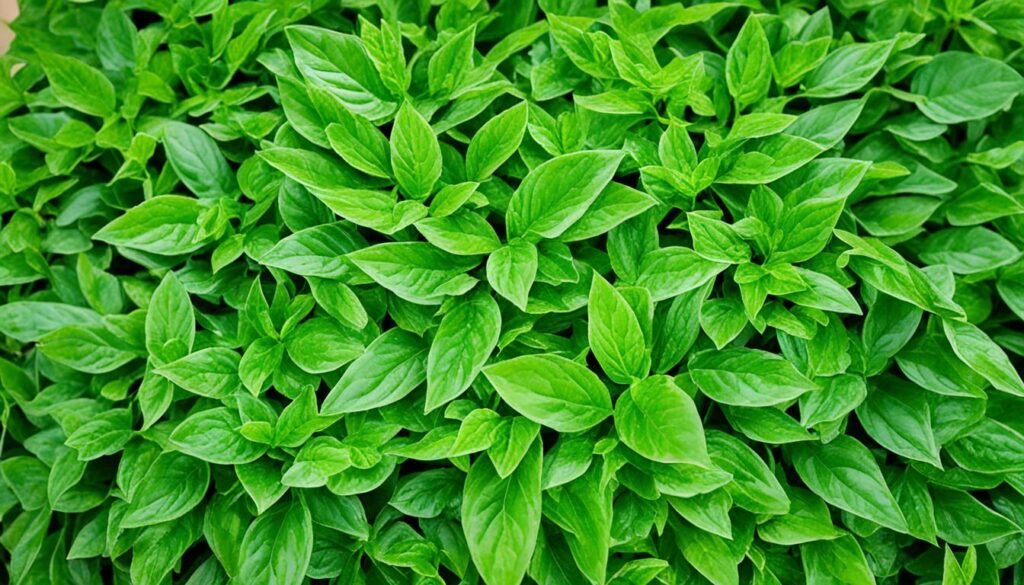
Low Maintenance and Versatile Herbs
Herbs grown in containers are generally low maintenance. They require less weeding and are less susceptible to pests and diseases compared to plants grown in traditional gardens. Container gardening also allows you to easily move your herbs around to find the best growing conditions.
Additionally, the versatility of herbs makes them an ideal choice for container gardening. You can grow them for their culinary uses or simply enjoy their beauty as ornamental plants with glossy green leaves.
Aromatic and Flavorful Culinary Use
One of the greatest joys of growing herbs in containers is the ability to access fresh, aromatic leaves for culinary use. Whether you’re adding basil to your pasta sauce, garnishing dishes with fresh chives, or infusing your beverages with fragrant mint, herbs grown in containers provide a continuous supply of flavor and aroma to enhance your favorite recipes.
Companion Planting for Container Herb Gardens
In container herb gardening, companion planting is a beneficial practice that allows you to plant different types of herbs together in the same container. This not only creates a visually appealing garden but also adds variety to your culinary creations. When selecting herbs to plant together, consider their compatibility and growing requirements.
Choosing Complementary Herbs
When planning your container herb garden, choose herbs that complement each other well. Look for herbs that have similar growing requirements and can thrive in the same environment. For example, rosemary and thyme are both drought-tolerant herbs that prefer well-drained soil and full sun. Planting them together will create a harmonious herb garden with complementary flavors.
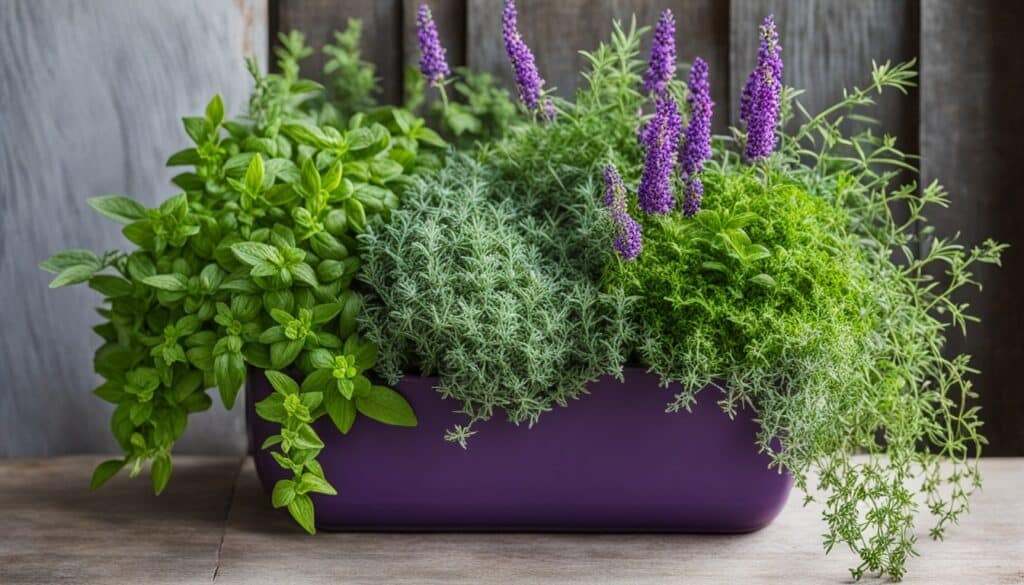
| Complementary Herb Pairings | Benefits |
|---|---|
| Rosemary and Thyme | Both herbs have similar growing requirements and can thrive together. They add depth of flavor to dishes and are commonly used in Mediterranean cuisine. |
| Basil and Parsley | These herbs are great companions as they both enjoy moist soil and partial shade. Basil adds a sweet, fresh flavor, while parsley brings a mild, grassy taste to dishes. |
| Mint and Lemon Balm | Both herbs thrive in moist soil and partial shade. Mint adds a refreshing, cooling element to beverages and desserts, while lemon balm offers a citrusy aroma. |
Benefits of Companion Planting
Companion planting in container herb gardens offers numerous benefits. It helps repel pests and attract beneficial insects, creating a natural balance in your garden. Some herb pairings can also enhance the growth and flavor of neighboring plants. For example, planting chives near tomatoes can improve their flavor and repel pests.
Companion planting in container herb gardens allows herbs to work together, benefiting each other and creating a thriving garden.
Creating a Visually Appealing Garden
Planting different types of herbs together in containers not only ensures a harmonious growth environment but also creates an aesthetically pleasing garden. Diverse herb varieties with varying colors, textures, and heights make your container garden visually appealing and add interest to your outdoor space. Consider incorporating herbs with attractive foliage, such as purple basil or variegated thyme.
Companion planting in containers opens up endless possibilities for creative combinations. Experiment with different herb pairings and observe how they interact and thrive together.
Tips for Successful Container Herb Gardening
When it comes to growing herbs in containers, it’s essential to follow these tips for successful herb gardening. By implementing these recommendations, you can ensure that your herb garden thrives throughout the growing season.
Regularly Trim and Replant Your Herbs
One of the keys to promoting healthy growth in your container herb garden is to regularly trim and replant your herbs. Trimming not only helps maintain the desired shape and size of your herbs but also encourages new growth. Replanting your herbs every season or when they outgrow their current containers ensures that they have enough space for their roots to spread and access essential nutrients.
Harvest Throughout the Growing Season
Another tip for successful container herb gardening is to harvest your herbs throughout the growing season. Regular harvesting not only allows you to enjoy fresh herbs in your culinary creations but also promotes new growth. When harvesting, be sure to leave enough foliage on your plants to allow them to continue photosynthesis and produce energy for new leaves.
Prune Woody Herbs
“Pruning woody herbs is crucial for maintaining their shape and encouraging bushiness.”
Woody herbs, such as rosemary and thyme, can become leggy over time. To prevent this, it’s important to prune them regularly. Pruning woody herbs helps maintain their shape, prevents them from becoming too woody, and encourages bushiness. Trim back any excessively long or straggly branches to keep your woody herbs healthy and thriving.
Ensure Proper Drainage
Proper drainage is essential for the health of your container herb garden. Without good drainage, herbs are at risk of developing root rot, which can be detrimental to their overall growth and survival. Make sure your containers have drainage holes at the bottom to allow excess water to escape. Additionally, using a well-draining potting mix and monitoring the moisture levels in the soil can help avoid waterlogging.
Provide the Necessary Care
“Maintaining good drainage and providing the necessary care will help your herbs thrive all season long.”
Lastly, providing the necessary care is vital for the success of your container herb garden. Alongside regular trimming, replanting, and harvesting, make sure to monitor the moisture levels in the soil and water your herbs as needed. Each herb has slightly different watering requirements, so it’s essential to research and meet the specific needs of each herb in your garden.
By following these tips for growing and maintaining herbs in containers, you can create a thriving herb garden that adds both beauty and flavor to your space. Remember to enjoy the process and experiment with different herbs to find the ones that are easy to grow and best suit your culinary preferences.
| Tips for Successful Container Herb Gardening | Keywords |
|---|---|
| Regularly Trim and Replant Your Herbs | trim, replant |
| Harvest Throughout the Growing Season | harvest, growing season |
| Prune Woody Herbs | prune, woody herbs |
| Ensure Proper Drainage | drainage |
| Provide the Necessary Care | necessary care |
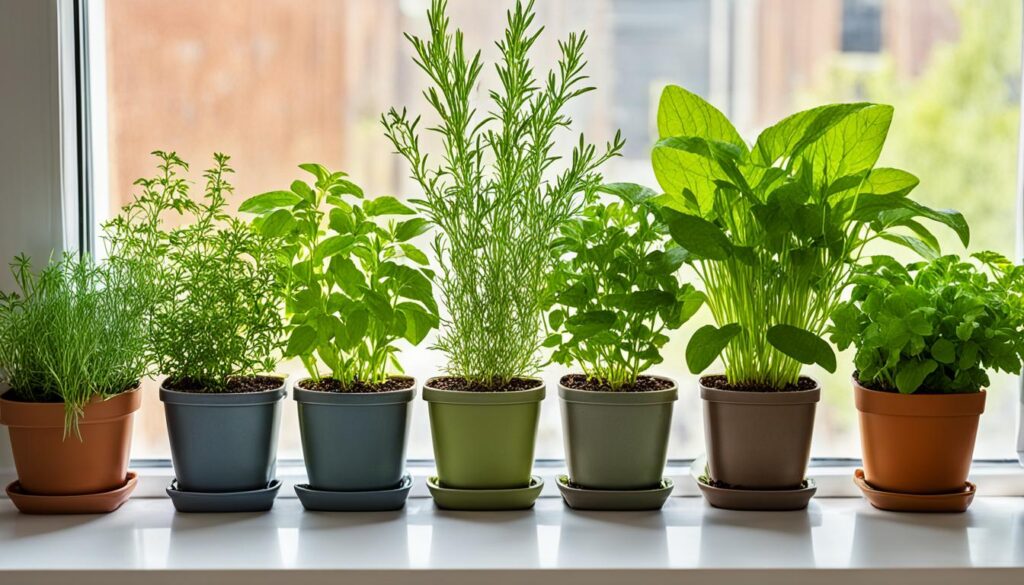
Indoor Herb Gardening: Bringing the Outdoors Inside
Indoor herb gardening is a convenient and delightful way to bring the freshness of the outdoors into your home. Whether you have limited space or simply want easy access to fresh herbs while cooking, growing herbs indoors is a wonderful solution. A sunny windowsill in your kitchen garden can be the perfect spot to nurture your herb containers and enjoy the benefits of having fresh herbs at your fingertips.
When it comes to growing herbs indoors, there are several varieties that thrive in pots. Herbs like basil and mint are particularly well-suited for indoor gardening. These versatile herbs can add a burst of flavor to your dishes and are known for their vigorous growth in indoor environments.
Creating an indoor herb garden allows you to enjoy fresh herbs year-round, regardless of the weather outside. Whether you live in a small apartment or a house with limited outdoor space, indoor herb gardening allows you to cultivate a kitchen garden that suits your needs.
By placing containers of herbs on a sunny windowsill in your kitchen, you not only have access to fresh ingredients but also create a visually pleasing and aromatic display. The vibrant green leaves of the herbs will bring life and beauty to any indoor space.
Discovering the best herbs for indoor gardening is an exciting journey for any herb grower. From classic favorites like parsley and thyme to exotic varieties like lemongrass and Thai basil, there’s an extensive selection of herbs to choose from. Consider your culinary preferences and growing conditions to determine the best herbs for your indoor garden.
The Culinary Delights of Fresh Herbs
When it comes to culinary masterpieces, fresh herbs are the secret ingredients that take your dishes from ordinary to extraordinary. Whether you’re adding a sprinkle of chives to your salad or garnishing a dish with fragrant mint leaves, herbs bring a delightful zing and depth of flavor to your meals.
To enjoy the full potential of these culinary wonders, it’s important to plant herbs in your own garden. Whether you have a spacious backyard or limited space on your patio, growing herbs in containers is a convenient way to have your favorite herbs at hand.
For optimal growth and flavor, it’s essential to ensure your herb containers receive at least 6 hours of direct sunlight. To achieve this, place your herb containers on the edge of the pot, where they can bask in the sun’s warmth and soak up the nourishing rays. This way, your herbs will thrive, providing you with an abundance of aromatic leaves to enhance your dishes.
Experiment with an array of herbs to discover your personal favorites! From the vibrant green leaves of chives to the refreshing taste of mint, each herb offers its unique flavor profile and culinary versatility. Let your taste buds guide you as you explore the various options and combinations that best complement your cooking style.
Also Read:- Sowing Serenity: Creative Herb Garden Designs For Every Space
There’s no denying the pleasure and satisfaction that comes with using fresh herbs in your culinary creations. With each bite, you’ll experience bright and vibrant flavors that elevate the simplest of dishes to new heights. So, plant your herb garden, grow your favorite herbs, and immerse yourself in the enchanting world of fresh culinary herbs!
Popular Herbs for Culinary Delights
| Herb | Culinary Uses |
|---|---|
| Chives | Salads, soups, eggs, and creamy dressings |
| Mint | Beverages, desserts, salads, and savory dishes |
| Basil | Pasta sauce, pesto, pizza, and fresh salads |
| Parsley | Herb butter, garnish, sauces, and marinades |
“Using fresh herbs in your cooking is like adding vibrant brushstrokes to a masterpiece. The flavors and aromas they bring to your dishes are simply extraordinary.” – Chef [Author Full Name]
Best Practices for Container Herb Gardening
To achieve optimal growth in your container herb garden, it’s important to follow these best practices:
- Ensure your pots have holes in the bottom to allow excess water to escape, preventing waterlogged roots.
- Water your herb plants every 3 to 4 days or when the soil feels dry to the touch. Consistent watering helps to keep the plants hydrated.
- Place your herb containers in a location that is conveniently outside your kitchen door or on your patio or balcony. This allows you to easily access your herbs while cooking.
- Experiment with different types of planters to find what works best for your space. Consider using plastic pots for smaller herbs and larger pots for herbs that require more space.
Conclusion
Container gardening is the perfect solution for anyone who wants to grow their own herbs but has limited space. By carefully selecting the right herbs and choosing suitable containers, you can create a thriving herb garden in small spaces, such as patios or windowsills. Growing herbs in containers is not only practical but also rewarding and enjoyable.
Whether you are an experienced gardener or a beginner, container gardening allows you to experience the joy of harvesting and cooking with fresh, aromatic herbs. Imagine plucking a few sprigs of basil or mint from your own mini herb garden to add a burst of flavor to your dishes. With container gardening, you have the convenience of having your herbs just a few steps away.
So why wait? Start your container herb garden today and embark on a journey filled with the delights of growing and using your own herbs. Whether you have a sunny patio, a cozy balcony, or a small windowsill, you can create an oasis of fresh greenery and incredible flavors. Get your hands dirty, tend to your herbs, and enjoy the satisfaction of cultivating your very own herb garden.
FAQs
Q: What are the best herbs to grow in containers?
A: Some of the best herbs to grow in containers include mint, basil, parsley, thyme, rosemary, and oregano.
Q: How do I grow herbs in pots?
A: To grow herbs in pots, make sure the containers have proper drainage holes, use quality garden soil, and provide enough sunlight for the herbs.
Q: Why are herbs great for growing in small gardens?
A: Herbs are great for small gardens because they don’t require a lot of space and can easily be grown in containers or pots.
Q: What are some tips for growing herbs in containers?
A: Some tips for growing herbs in containers include choosing the right container size, providing adequate sunlight, and regular watering.
Q: Can I also grow mint in a container?
A: Yes, mint is a herb from the mint family that can be easily grown in a container with proper care and maintenance.
Q: Are there any affiliate links related to container gardening for herbs?
A: Some websites may provide affiliate links for purchasing containers, gardening tools, or herb seeds for growing in containers.
Q: How do I plant herbs in a container with the best chance of success?
A: To plant herbs in a container successfully, ensure the herbs have enough space to grow, use well-draining soil, and provide adequate sunlight.
